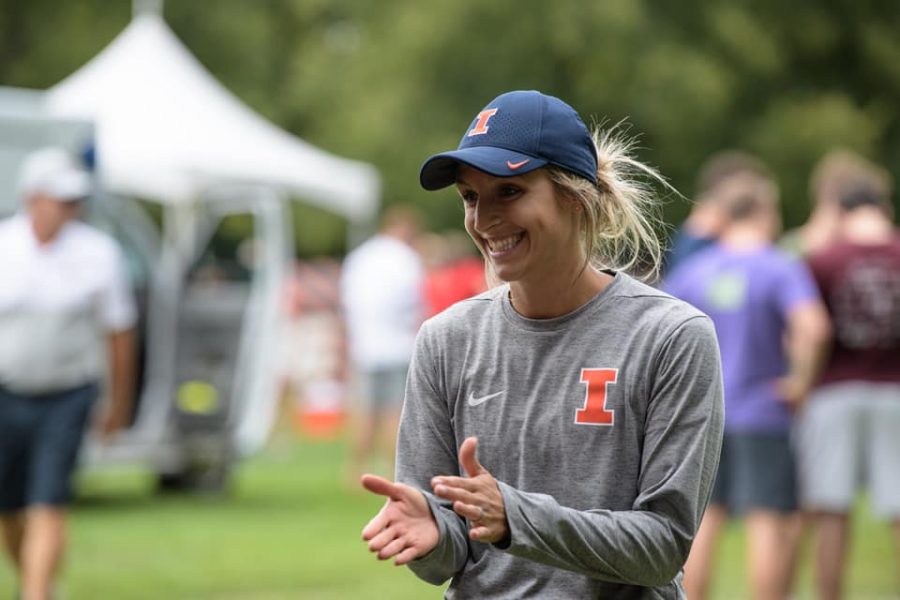Cross country, track and field teams deal with postponed competition, possible season overlap
Photo Courtesy of Fighting Illini Athletics
Women’s cross country and track head coach Sarah Haveman claps at a cross country meet,
Sep 15, 2020
As the Big Ten sports world continues to reel from the conference’s decision to postpone fall athletics in August, many coaches and players are dealing with the logistical issues raised by playing fall sports in the spring, such as cross country and track and field. Although cross country is a fall sport, track and field compete in the spring, meaning the two seasons would overlap if fall sports were to be moved to later in the school year. However, this issue is particularly challenging for these sports due to the fact that many cross country athletes also run for the track team in some capacity.
“It sucks, there’s no other way to put it,” said senior Jack LaLonde on the postponement. “For myself, life goes on. That’s kind of what I’ve had to tell myself … It’s a very big bummer.”
Even if the season were to take place in the spring, LaLonde would possibly not be able to compete, as he is in his last semester and, as of now, does not plan to continue his studies at Illinois in the spring. This would be a major disappointment for LaLonde, who hoped to follow a strong junior season, in which he scored for Illinois at both the Big Ten Championships and the NCAA Midwest Regional.
Senior Allison McGrath was a standout runner for the cross country team last season, as she led the team at the NCAA championships and finished 22nd overall at the Big Ten championships. However, McGrath said the team is still having practice and running as much as they can, given the safety requirements in place.
“It’s definitely not what any of us were hoping for this fall,” McGrath said.
Get The Daily Illini in your inbox!
Sarah Haveman is the men’s and women’s cross country head coach and also serves as an assistant coach for track and field. She says many college athletics officials are hesitant to take opportunities away from students. She also cast doubt on the possibility that student-athletes would be forced to decide on which of the two sports they would compete in. She said some coaches or administrators would likely step in to prevent them from making such a tough decision.
“As a coach, one of the biggest focuses I have is getting the student-athletes to focus on things that they can control,” Haveman said. “This has been the ultimate test of that … The reality of it is, at some point we’re going to compete again, and I’ll make sure (the players) are ready.”
Haveman also noted that the pandemic has made recruitment much more difficult, though she wants to look at the positives of the unique situation. Haveman says it was likely the hardest on future student-athletes, as they have less time and resources to visit schools they like in order to make their final decisions.
“Coaches can get creative,” Haveman said. “We still are able to talk to who we need to … and get to know them deeper if we need to.”
Some fall student-athletes have called for fall sport athletes to be granted an extra year of eligibility in the face of such unprecedented circumstances.
“I really want to compete in cross country again,” LaLonde said. “I would absolutely think about it … but it’s a little out of my hands at this point.”
Regardless of what happens with extra eligibility next fall, McGrath is currently planning to return to Illinois to pursue a master’s degree next school year.






